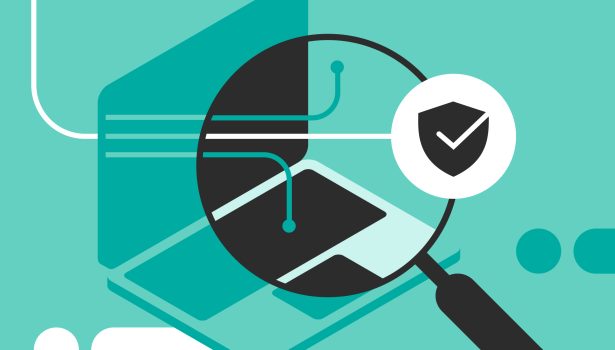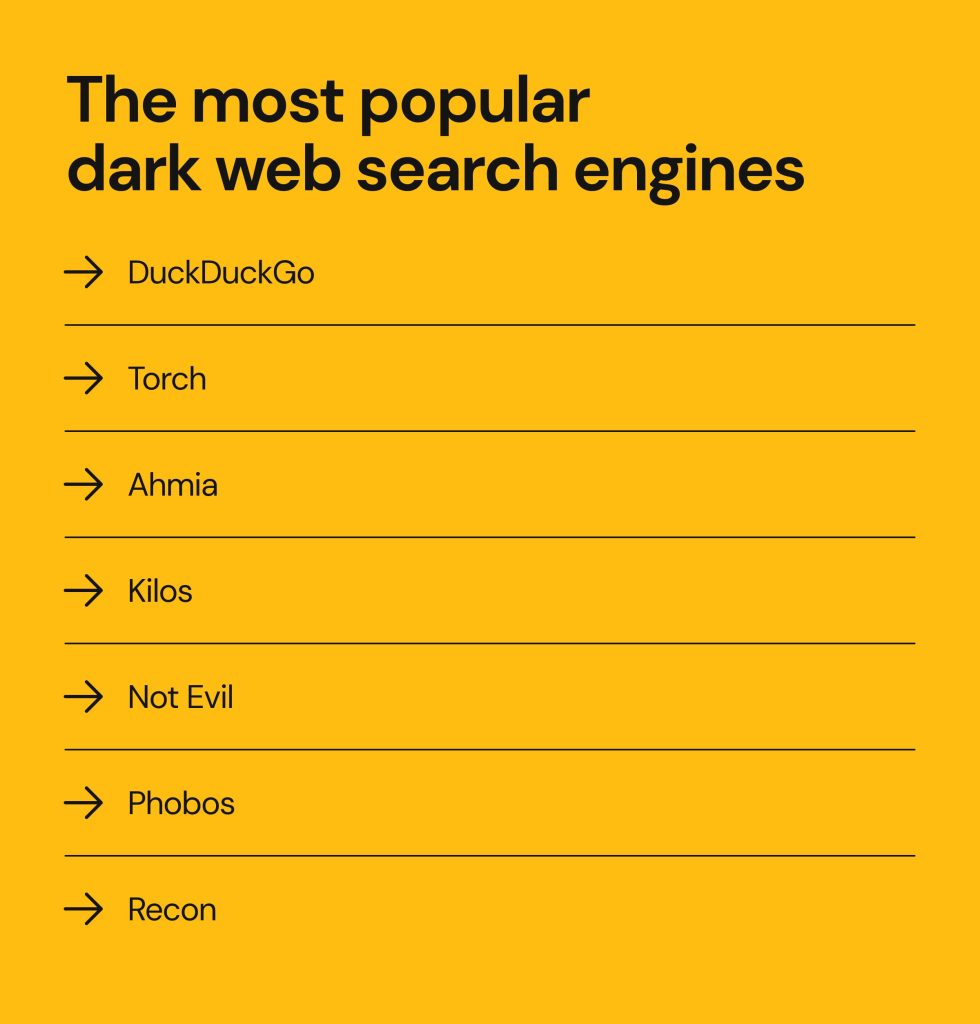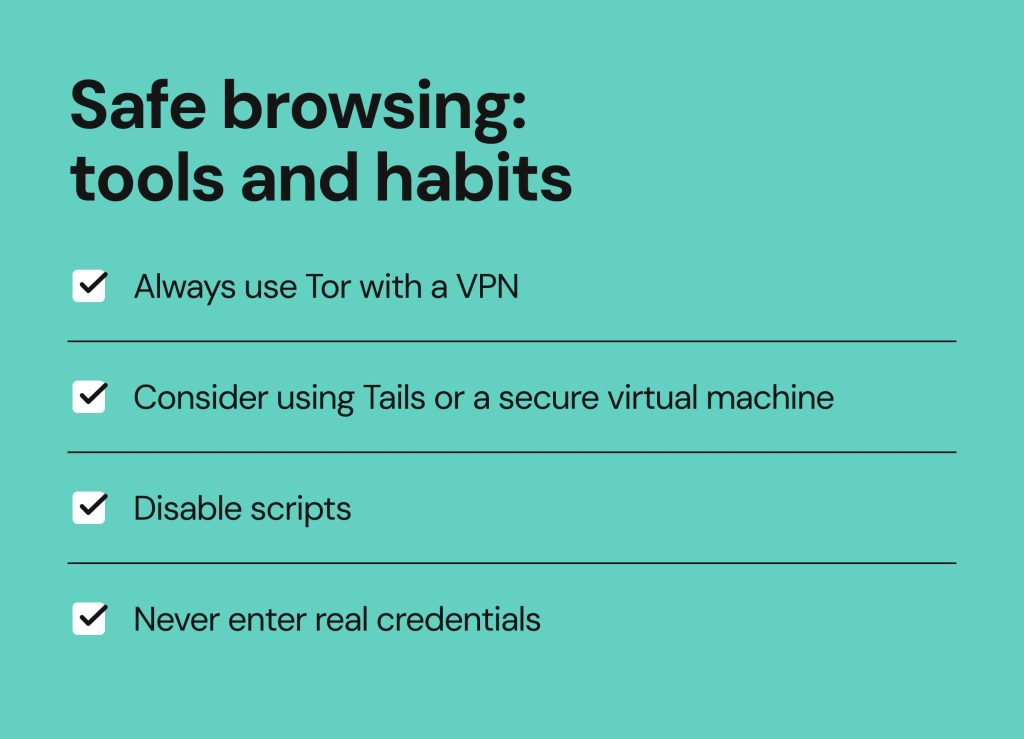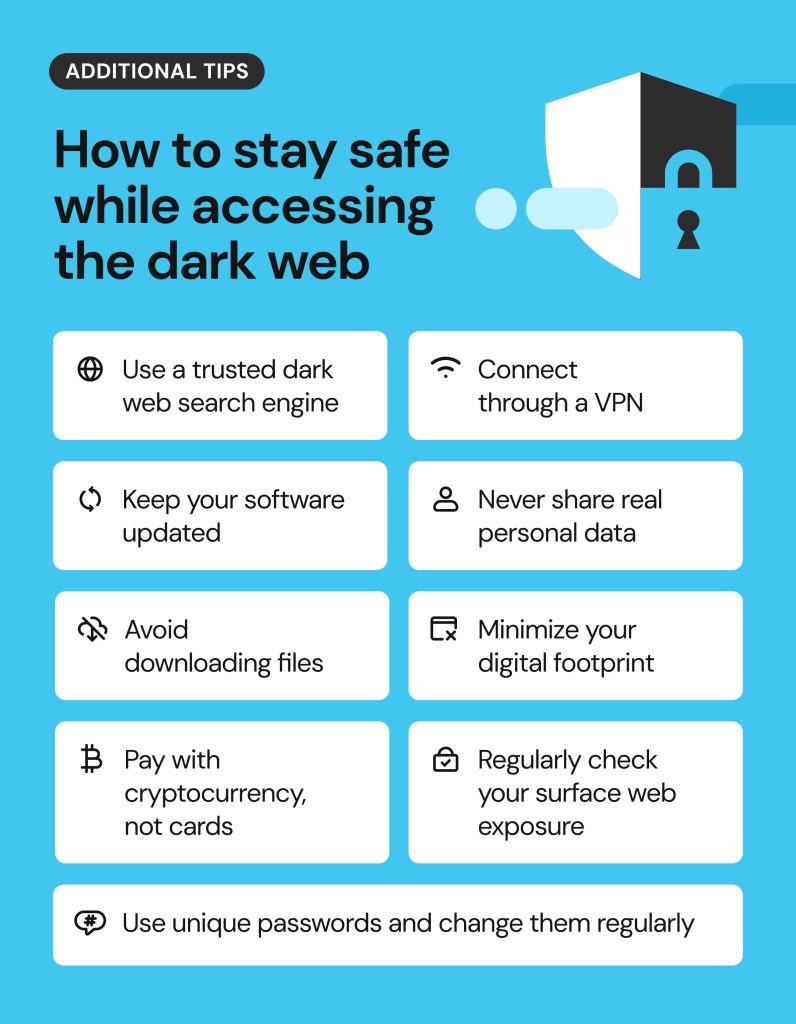Dark web search engines: how to search the dark web safely

We use the web daily. However, the majority of sites are hidden and sit in an online space called the deep web, where the darknet is only a small portion.
The dark web isn’t indexed by regular search engines and is known as a hotbed of criminal activity. While that’s sometimes true, it can also be used for ethical purposes.
A combination of specific tools allows users to access the darknet and navigate hidden pages that traditional search engines like Google or Bing can’t reach while staying anonymous.
Read on to learn how dark web search engines work, how they differ from what we usually use, and how to safely navigate those sites.
What is the dark web, and why it’s different
Think of the entire web as an iceberg. The surface web—which we use for searching day-to-day information—is only its tip. Many more layers of hidden content can be found below—in the deep and dark web.
Understanding the surface, deep, and dark web layers
- Surface web (or open web): this portion of the web is visible to the average user and search engines like Google and Bing. Although it includes some of the most popular .com, .net, and .org sites, the open web represents only about 5% of the total content available on the internet.
- Deep web: this is the second and largest layer of the web (up to 90%), and it can also be accessed using a regular browser. Intentionally hidden beneath the surface, the deep web includes pages that require a login, like private file collections. Its contents—email messages, chat messages, private content on social media, online bank statements, and electronic health records (EHRs)—can’t be indexed.
- Dark web (or darknet): this subset of the deep web requires specific tools like the Tor browser for access. Dark web sites are encrypted and can’t be indexed using conventional search engines, which makes browsing and navigating their contents difficult compared to the surface web. Thanks to its anonymous and decentralized nature, the dark web is often used for illegal purposes.
How onion search engines work
The Onion Router (Tor, for short) is a network that masks online traffic. The Tor browser is open-source and is used to access the dark web, where data is encrypted and routed through multiple relays before reaching its destination.
.onion domains—automatically generated by Tor clients once a hidden service is set up—consist of a series of alphanumeric characters followed by “.onion.” Standard browsers can’t access .onion pages directly; this requires using either the Tor browser or another Tor-compatible browser for navigation.
These domains are used for dark web sites seeking anonymity, where both the users’ and the providers’ identities are difficult to trace. .onion domains are not part of the standard Domain Name System (DNS) and aren’t registered in the traditional way. Dark web sites are not indexed, so they won’t appear in search results unless you know the exact .onion URL of the site you’re looking for.
.onion websites regularly change domains to make it harder to track them or when the sites collapse, resulting in multiple complete copies (domains) for each site, called mirrors. Tor sites are unstable, with most of them often being under construction. This leads to data loss, content changes, and inconsistency in the quality of results. Sites are often shut down and backed up as admins try to avoid being caught.
What is a dark web search engine?
While operating similarly to its surface web counterparts, a dark web search engine is an online tool built to find .onion content hosted on the Tor network and ensure anonymity. These crawlers are designed to respect the network’s anonymity protocols and provide search results based on query keywords. A dark web search engine’s index is significantly smaller compared to the surface web due to its hidden nature.
The most popular dark web search engines
DuckDuckGo
Think of DuckDuckGo as Google but for the darknet. It is the default search engine on the Tor browser. With a simple and recognizable interface similar to Google, this search engine has a search box in the middle of the page, and search results are formatted like what we’re used to seeing in traditional search engines.
DuckDuckGo is not designed solely for dark web search, as it can also be used to browse the surface web. However, it still offers a no-log policy, which means it doesn’t record your activity or collect other user data.
Torch
Torch is believed to be one of the oldest and most trusted darknet search engines. It scrapes new .onion sites every day, with over 4 million web pages already indexed to date. Torch doesn’t filter unsafe content, so search results are not censored and may include lesser-known sites. Although Torch offers the largest index among other search engines, it is also known for a large volume of ads, which can be intrusive or misleading.
Ahmia
This deep web search engine can be accessed via the surface web and Tor. It filters out illegal and unsafe content, so users can expect a more secure experience. Content filtering, though, makes a smaller, yet safer, index. Ahmia can also be used to view insights, news, and statistics about the Tor network.
The Ahmia search engine also has a strict policy against “abuse material,” focusing on users’ protection from potentially dangerous content and malicious attacks. With Ahmia, users can search for both clear web URLs and .onion links.
Not Evil
This one also filters illegal content and is designed solely for the dark web. Ensuring user anonymity, Not Evil has no ads, web tracking and presents lower risks of malware attacks. Its index mostly focuses on active forums and topics like privacy.
The Not Evil is relatively safe, as it doesn’t track users; however, it doesn’t filter malicious content, so caution is still needed. Although reported as active, there is limited information on Not Evil’s current status, so availability may vary.
Kilos
Kilos offers multiple forums and dark web marketplaces for specified products. This search engine also offers advanced filtering, ensures fast search, and is known for illegal activities, so it is not recommended for general usage. Its extensive and unfiltered search results also attract cybercriminals, so it’s important to be extremely careful when using the Kilos dark web search engine.
Phobos, Recon, and others
Now let’s go through some lesser-known tools:
- Phobos: this search engine is a very minimalistic and simple underground tool for .onion websites, focused on a general index. It works very much like Google.
- Recon: it is a new market/vendor data aggregator service that offers access to forums and marketplaces on the dark web.
- Deep Search: this is an open-source dark web search engine designed for the Tor network. It is known for its index accuracy and lack of spammy links.

Is it safe to use a dark web search engine?
Knowing safety practices and how to avoid being scammed allows users to use the darknet for searching information similar to how they would use Google:
Fake services, malware, and scams
The dark web’s unstable and insecure nature makes it easier for hackers to access users’ sensitive data. For example:
- Many of the links indexed by dark web search engines may look normal but lead to fake or malicious content, like mirror pages mentioned above.
- The dark web can distribute malware, including viruses and ransomware.
- Phishing attacks are also common, as hackers send keyloggers and pre-built exploits to gain access to credentials, financial details, and personal records.
- There’s also the risk of buying goods on the darknet and paying for them, only for the vendor to vanish without delivering.
Safe browsing: tools and habits
- Always use Tor with a VPN: Tor prevents activity tracking, but a VPN encrypts your traffic, hides your IP address, and provides an additional layer of protection.
- Consider using Tails or a secure virtual machine: The Amnesic Incognito Live System (Tails) is an open-source and free operating system that preserves privacy and anonymity against surveillance. It connects to the internet only through the Tor network.
- Disable scripts: considered one of the best security measures, disabling JavaScript in Tor reduces risks of tracking and malicious code. To do this, go to the Security tab of the Tor browser, click the small gray shield at the top of the screen, and find “Advanced Security Settings.” Here, you can disable and enable JavaScript in Tor. Select the “Safer” level to block scripts on HTTP sites and the “Safest” level to block JavaScript altogether.
- Never enter real credentials: create brand-new throwaways and identifiers when using the dark web. Your real name, email address, active passwords for accounts you use, and your credit card details should never be used anywhere on the dark web. Acquire prepaid, unidentifiable debit cards if you plan to use the dark web for any purchases.

Please note: Protecting your personal records and any information that can identify you, both during and after using the dark web, should be a consistent habit rather than a one-time precaution.
What you should (and shouldn’t) search on the dark web
Legal and ethical use cases
The darknet is often used for illegal purposes, like cybercrime, buying drugs and weapons, and selling stolen identities. But it can still be a tool with legal and positive applications when used responsibly. For example:
- Open-source intelligence gathering: the dark web can play a significant role in OSINT investigations, as it contains vast amounts of data that cannot be found through traditional search engines.
- Journalism, activism, and anonymous whistleblowing: the darknet’s privacy and anonymity make it a useful tool for journalists, activists, and others to communicate freely and securely.
- Exploring forums in repressive countries: those living in countries with repressive political regimes often have limited browsing capabilities via regular search engines. A combination of the dark web and a VPN hides their location and activity and allows users to gain a more realistic picture of what is going on in the world– without imposed web restrictions.
Risks of exploring illicit markets
Similar to using a regular web browser to access the surface web, visiting the darknet is legal. Regardless of the browser’s anonymity, it is still illegal to commit fraud or engage in any illegal activity on the dark web. According to a 2020 estimate conducted by Prey Project (a security service platform), 57% of the dark web is illegal.
Dark web users should realize that although their activity is technically anonymous, communicating with, associating with, or being around people conducting illegal activities can have legal implications.
For example, takedowns of the three most popular darknet marketplaces—Silk Road, AlphaBay, and Wall Street Market—have led to hundreds of arrests, underscoring the risks of illegal actions in any form.
Additional tips on how to stay safe while accessing the dark web
The dark web opens doors to information not indexed by regular search engines and poses significant security risks that come along. Here are some tips for navigating the dark web as safely as possible:
- Use a trusted dark web search engine: choose a trusted search engine based on what you expect from the search results: forums, marketplaces, or a general index.
- Connect through a VPN: it adds an extra layer ofencryption, hides your IP address, and protects your identity from malicious actors.
- Always update your software: this applies to the operating system, browsers, and any security tools you use for dark web navigation, as updates contain patches for new vulnerabilities tha cybercriminals can exploit.
- Never share your real data: create a new identity when using the dark web, and avoid sharing any personally identifiable information, such as your real name, home address, phone number, and credit card details.
- Do not download any files: it’s extremely risky to download files from the dark web, as they often contain malware or viruses designed to infect your software and obtain your personal information.
- Use unique passwords and change them regularly: If you need to create accounts on the dark web, use strong, unique passwords that do not include your name,date of birth, job title, or any other information that could be easily guessed. Consider regularly changing passwords and using a trusted password manager like 1Password, which also supports 2FA verification.
- Do not pay with a card: if you use the dark web for purchases, consider paying with cryptocurrencies instead of credit cards, as crypto transactions are anonymous and more secure.
- Reduce your digital footprint: avoid sharing any personal information on your social media, messengers, or other platforms. Keep your profiles private, and do not send documents, credentials, and credit card details via chats.
- Regularly check your surface web exposure: it’s impossible to remove stolen personal information from the dark web, but it’s possible to prevent hackers from buying it from data brokers. Tools like Onerep scan data broker websites and remove your sensitive information – name, email address, phone number, and more – from those that expose it. The tool also continuously monitors the surface web to ensure your data doesn’t reappear– and therefore can’t be stolen and end up on the dark web.

Following these precautions and being mindful of ethical use cases will allow you to navigate the dark web more safely. Always monitor potential threats and stay aware of the risks involved.
FAQs
What is the best search engine for the dark web?
The best dark web search engine depends on what you are looking for: forums, marketplaces, or a general index. DuckDuckGo and Ahmia can be used for general .onion content on the dark web. Not Evil is mainly focused on forums and marketplaces, while also filtering illegal content.
Can you use Google to access the dark web?
No, Google and other traditional search engines don’t index .onion websites. To access the dark web, you need to use a combination of tools (like Tor + VPN + a dark web search engine) explicitly designed to find content on the dark web.
Are dark web search engines illegal?
Using dark web search engines is legal, although performing illicit acts on the dark web is not.
What’s the difference between Torch and Ahmia?
Torch is designed specifically to access a large volume of general .onion websites. Ahmia, in contrast, is a traditional web search engine compatible with the Tor network and filters out unsafe and illegal content when used for dark web navigation.





Mikalai is a Chief Technical Officer at Onerep. With a degree in Computer Science, he headed the developer team that automated the previously manual process of removing personal information from data brokers, making Onerep the industry’s first fully automated tool to bulk-remove unauthorized profiles from the internet.